What are the BEST Farm Chicken Breeds?
Finding the best farm chicken breeds was not as easy as I thought. Some require extensive care, others are prone to disease, and lots just are aggressive toward humans and other animals.
That’s why I created a list of the 10 BEST Farm Chicken Breeds!
This ultimate guide will give you the best farm chicken breeds, why you should own them, and even how to raise them.
Read THIS Before Raising Chickens
Knowing what type of chicken coop to own is almost as important as the chicken itself. To find the BEST Chicken Coop for your specific breed read the BEST Chicken Coops for Beginners!
And if you want to learn baby chicken behaviors, how to raise them, how to prevent predators, and so much more then watch the live stream of my chickens below!!!!
10 BEST Farm Chicken Breeds
#1. Buff Orpington
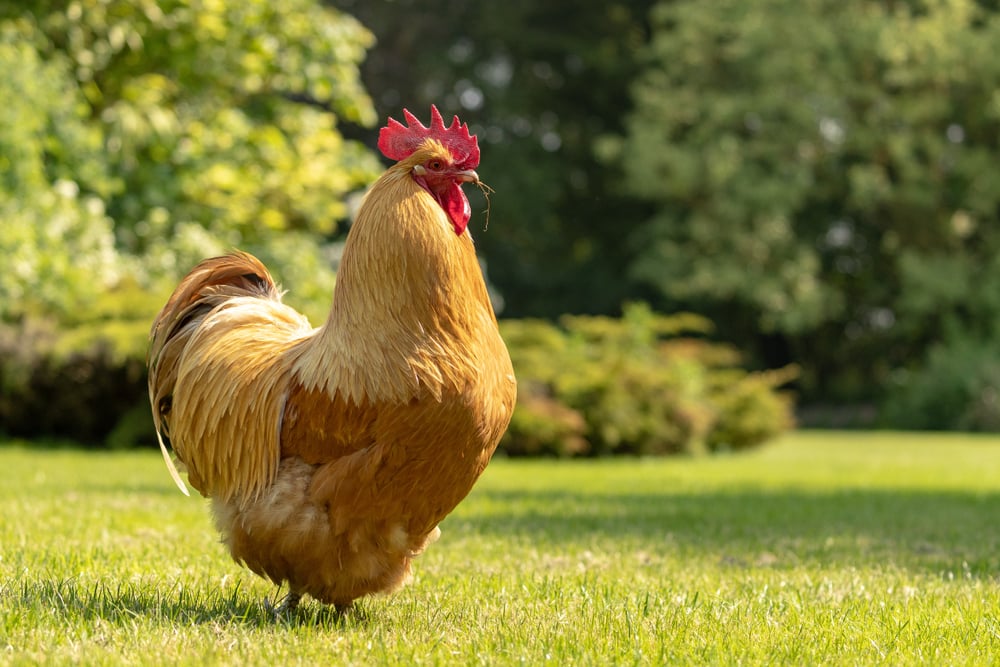
Why You Should Raise Buff Orpington Chickens on a Farm
Perfect Pet:
- Buff Orpingtons are one of the most docile chickens on the planet. They love being cared for, petted, and even enjoy sitting on laps. This makes it perfect farm chicken breed.
Lots of Eggs:
- Buff Orpingtons are a great chicken for those who want light brown eggs. They will lay between 200 to 275 eggs a year, perfect for most families!
Why You Shouldn’t Raise Buff Orpingtons
Pests:
- Deer, Rabbits, & Squirrels LOVE Lettuce. If left unprotected these pests will eat your vegetable before it can even grow.
Broody:
- The only real reason you shouldn’t have a buff orpington is that they can become broody in the summer months. The silver lining means that they are great mothers.
#2. Rhode Island Red
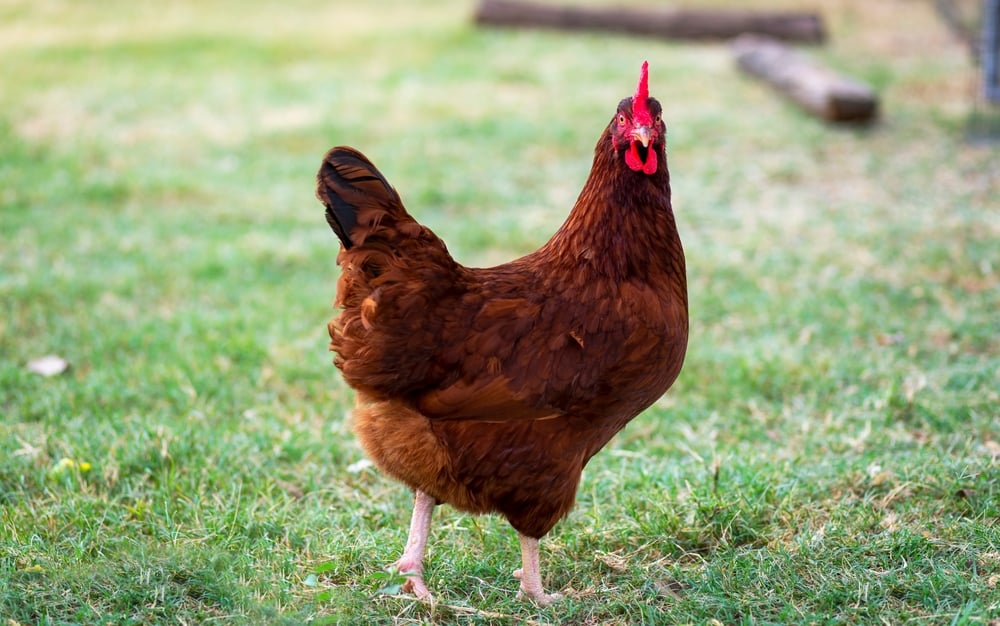
Why You Should Raise Rhode Island Red Chickens on a Farm
Friendly:
- The Rhode Island Red Chicken might be the friendliest chicken on this list, making it perfect for beginner chicken owners who want the best docile chickens. This friendly chicken makes it perfect for a farm.
Lots of Eggs:
- The Rhode Island Red Chicken also produces a LOT of eggs. 250 – 300 a year to be exact. Expect beautiful, brown eggs that can be eaten, shared with neighbors, or even sold.
Hardy
- The Rhode Island Red Chicken is also an incredibly hardy chicken. This means it can survive outside in cold conditions, can survive situations where new chicken owners are still learning, and rarely get sick.
Why You Shouldn’t Raise Rhode Island Red Chickens
Stand-Off Breed
- While Rhode Island Red chickens are friendly toward their owners, they have stand-off behavior toward other humans making them not the best neighborhood or farm pet.
Can Become Broody
- Although not frequent, rhode island red chickens can go broody from time to time. This means they will sit on their eggs an extra long-time trying to hatch them.
#3. Golden Comets
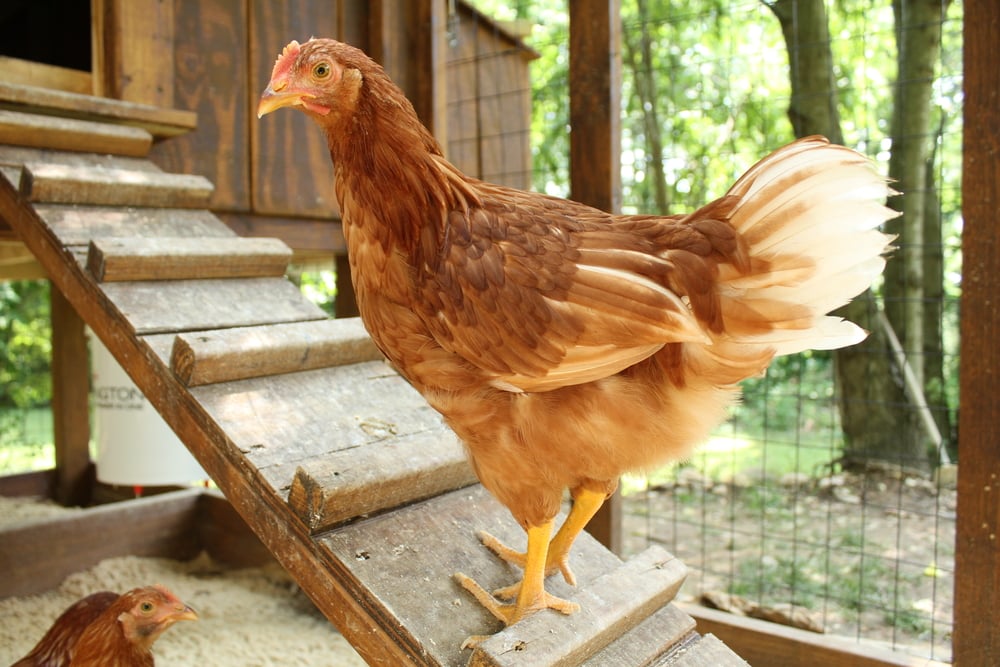
Why You Should Raise Golden Comet Chickens on a Farm
High Egg Yielder:
- Golden Comets are a hybrid breed. This small chicken consumes little food and produces almost 300 eggs a year!
Low-Maintenance:
- If you want to spend little money on food, water, and medicine then look no further than the Golden Comet. This hybrid chicken consumes the least amount of food of all chickens and has all the desirable traits of most chickens on this list, so you shouldn’t have to worry about it getting sick often.
Bred for Farmers:
- Blue Comet hybrid chickens were bred specifically for farmers. They won’t become broody, are easy to care for, and love to be around humans making them one of the best docile chicken breeds for farms.
Why You Shouldn’t Raise Golden Comet Chickens
Overbred:
- Blue Comet chickens have been known to be overbred. This means the chicken may not always be the healthiest or has to work a lot harder to produce eggs. Always get your chicken from a reputable breeder.
#4. Leghorn
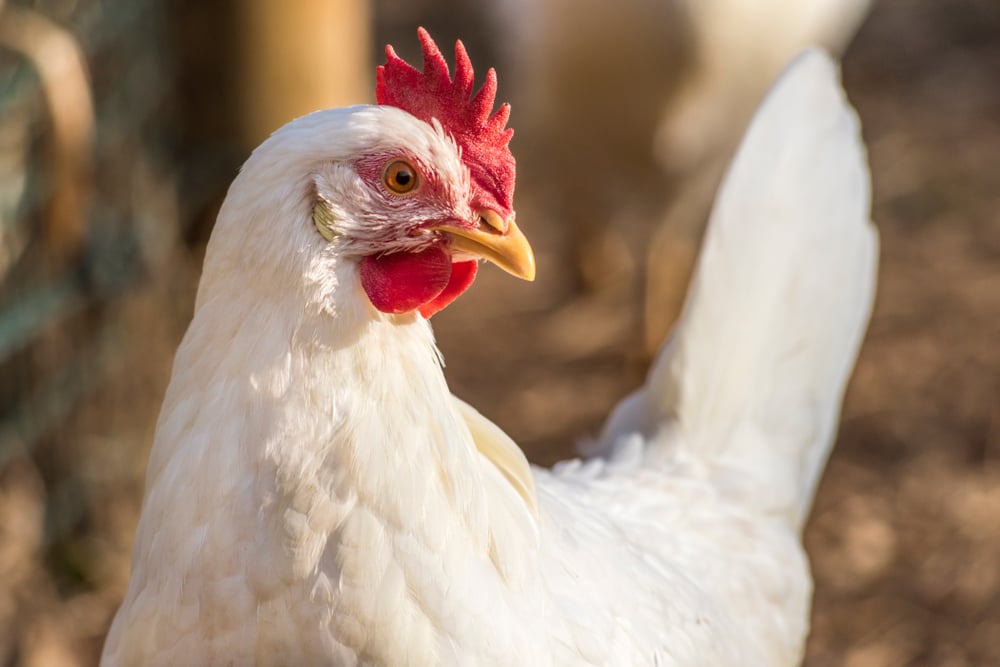
Why You Should Raise Leghorn Chickens on a Farm
Large Egg Layers:
- Leghorn chickens are known for the extra-large white eggs they lay. You can expect between 275 to 300 eggs a year from these hardy chickens.
Great Foragers:
- Leghorn chickens are some of the best foragers on the planet. This type of chicken is perfect to eat grass, and cracked corn, and clean your garden and yard when the season is over.
Great Pets:
- Leghorns are another type of chicken known for their great demeanor. They love children, are incredibly docile, and will sit on your lap, and are hardy in both the heat and the cold making it the perfect chicken for a farm.
Why You Shouldn’t Raise Leghorns
Too Plain:
- Leghorn chickens aren’t broody. They are tame. They are hardy. They have it all. But they are also plain colors. So if you want a fancy-colored chicken then avoid getting a leghorn chicken.
#5. Ameraucana
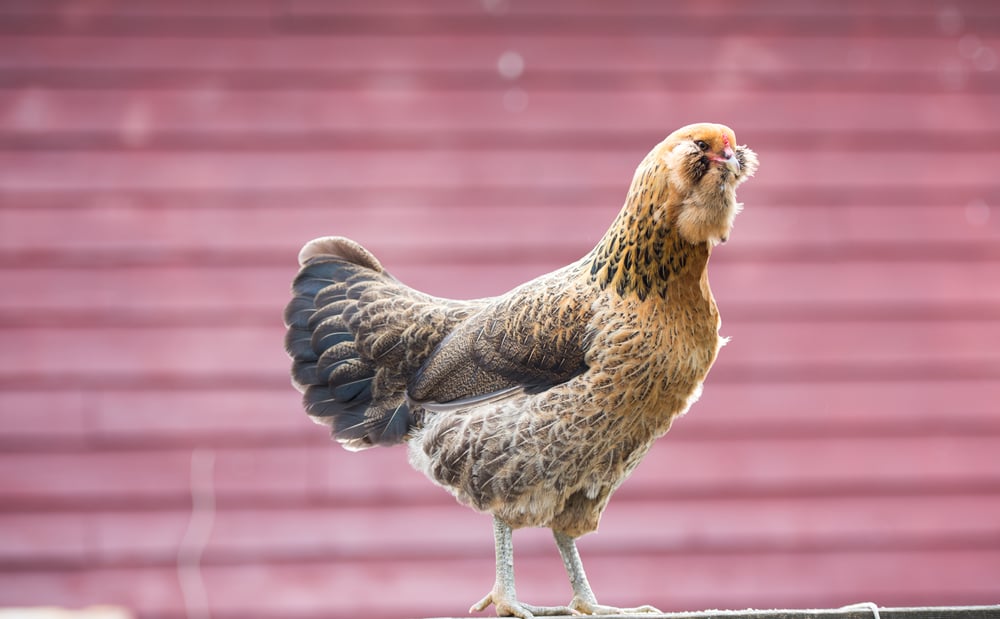
Why You Should Raise Ameraucana Chickens on a Farm
Beautiful Blue Eggs:
- Ameraucana Chickens lay beautiful blue eggs. They are one of the few chickens that lay blue eggs. It should be noted that they only lay 175 eggs a year.
Cold-Hardy:
- Ameraucana Chickens are some of the cold-hardy chickens out there. If you live in an area that gets lots of wind or has freezing winter temperatures then this is the easiest chicken to raise.
Pet:
- The Ameraucana Chicken is another great chicken to raise as a pet. They are playful, free rangers, and great around kids, other animals, and families. This makes it one of the best docile chicken breeds to raise on a farm.
Why Shouldn’t You Raise Ameraucana Chickens
Aggressive:
- While none of the chickens on this list are aggressive, the Ameraucana Chicken is the most aggressive chicken. Typically, this isn’t a problem with hens, but roosters can become extraterritorial.
#6. Plymouth Rock
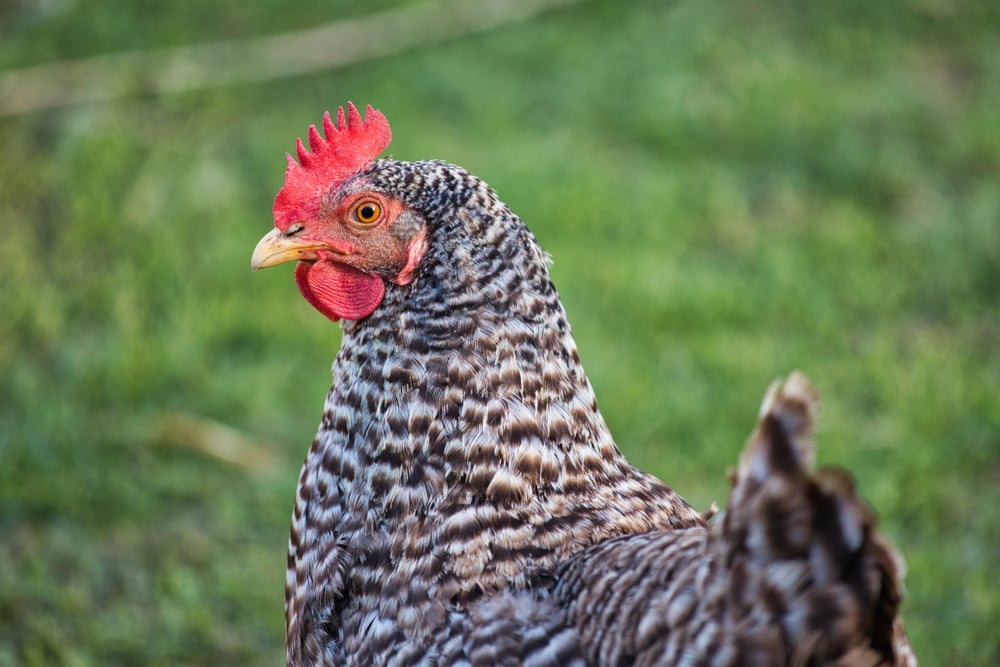
Why You Should Raise Plymouth Rock Chickens on a Farm
Beautiful:
- Plymouth Rocks are some of the most beautiful types of chicken. They have beautiful shades of white and black and are perfect to showcase to neighbors.
Egg-Layers:
- Like all of the other chickens on this list, the Plymouth Rock Chicken is perfect for about 1 egg a day! This makes it a perfect chicken for any family that wants to eat eggs consistently.
Great Pets:
- Chickens are friendly. But none is as friendly as Plymouth Rock. These chickens act almost like dogs as they will follow you around the yard and want constant attention. This makes them incredibly docile chickens for humans at a farm!
Why You Shouldn’t Raise Plymouth Rock Chickens
Fewer Eggs Than Others:
- Plymouth Rock Chickens lay fewer eggs than other chickens. Because of this, there may be better chickens for those seeking eggs.
Disease Prone:
- Plymouth Rock chickens are quite as hardy as other chickens. They can become prone to disease, are not as cold-hardy as others, and tend to get more parasites than others.
#7. Delaware

Why You Should Raise Delaware Chickens on a Farm
Low-Maintenance:
- Delaware Chickens are some of the easiest chickens to raise. All they need is a chicken coop, water, and food and that’s it!
Large Eggs:
- If you are looking for a chicken that will lay jumbo eggs then look no further than Delaware chickens. These chickens will lay 3 to 4 jumbo eggs a week!
Versatile:
- The Delaware Chicken is an incredibly versatile chicken. It can tolerate all types of climates, social settings, and human contact.
Why Shouldn’t You Raise Delaware Chickens
Noisy
- Delaware Chickens are some of the noisest chickens you can raise. While they are extremely happy and energetic, they can also make quite a bit of noise!
Few Eggs
- The Delaware Chicken is also a breed of chicken that lays far fewer chickens than most other types making it not the best chicken for those who seek lots of eggs!
#8. Australorp
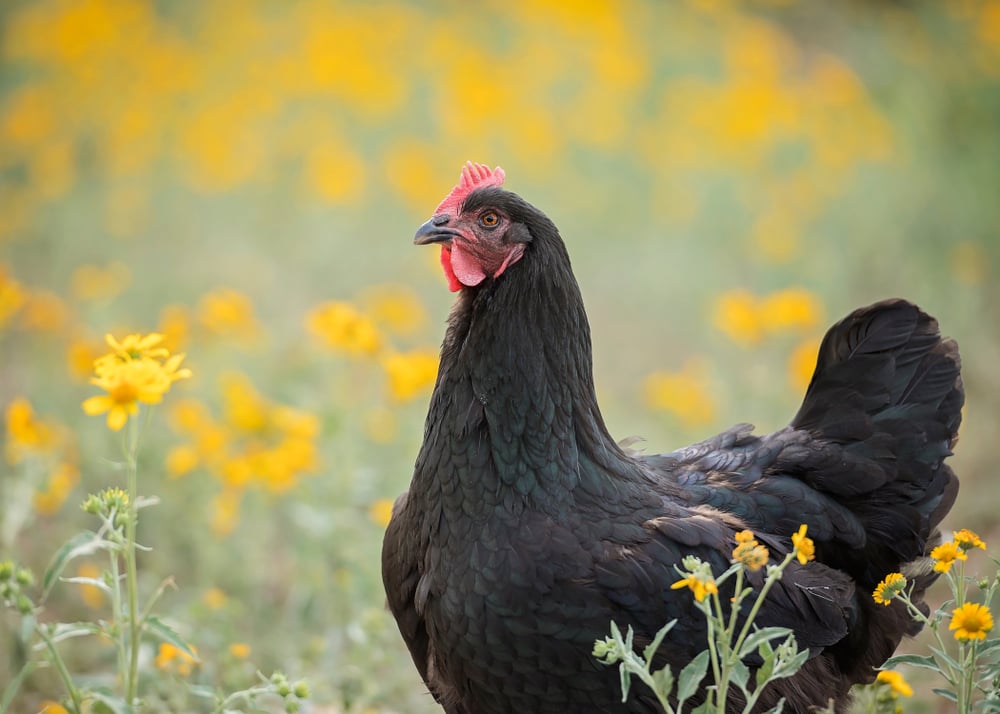
Why You Should Raise Australorp Chickens on a Farm
Cold-Hardy
- If you live in a cold climate and want one of the best chickens that can survive it then look no further than australorp chickens!
Brown Eggs:
- If you want brown eggs and a lot of them then you should get an Australorp chicken. This chicken will lay over 250 brown eggs a year!
Docile:
- Australorp chickens are some of the most docile chickens farmers can raise. This makes them incredibly easy to maintain and can make a great pet for a family on a farm.
Why You Shouldn’t Raise an Australorp Chicken
Heat:
- If you live a tropical climate or extremely warm area then you should not raise an australorp chicken. These chickens struggle to thrive in hot climates.
#9. Sussex
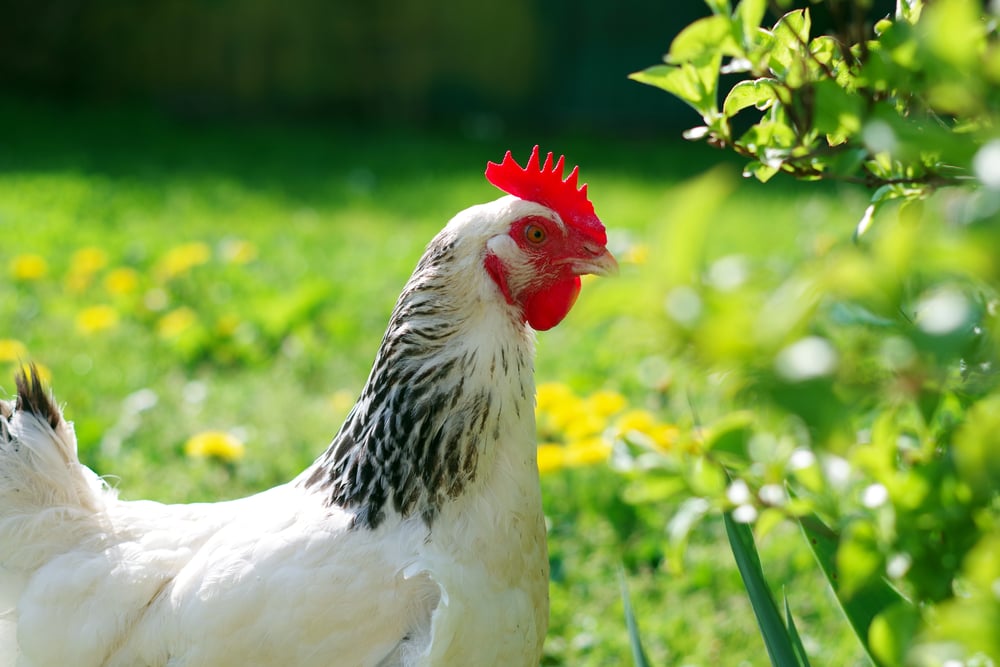
Why You Should Raise Sussex Chickens on a Farm?
Great Pets:
- The Sussex Chicken is an incredibly fun animal to have as a pet. They love treats and will follow you all over your yard like a dog to get them. They also love kids and playing with young families making them the perfect pet for a farm.
Cold Hardy:
- While Sussex Chickens can tolerate heat, this breed thrives in cooler climates and is the perfect type of chicken for long winters.
Why You Shouldn’t Raise Sussex Chickens
Require lots of feed:
- Out of all the chickens on this list, the Sussex Breed requires the most feed per egg. This isn’t a big deal if they will be free-ranging in your yard, but if they are not expect to spend more money on food for them.
Noisy:
- If you live in an area where noise will bother your neighbors or is considered a nuisance then avoid the Sussex chicken. This breed is the loudest on this list.
#10. New Hampshire
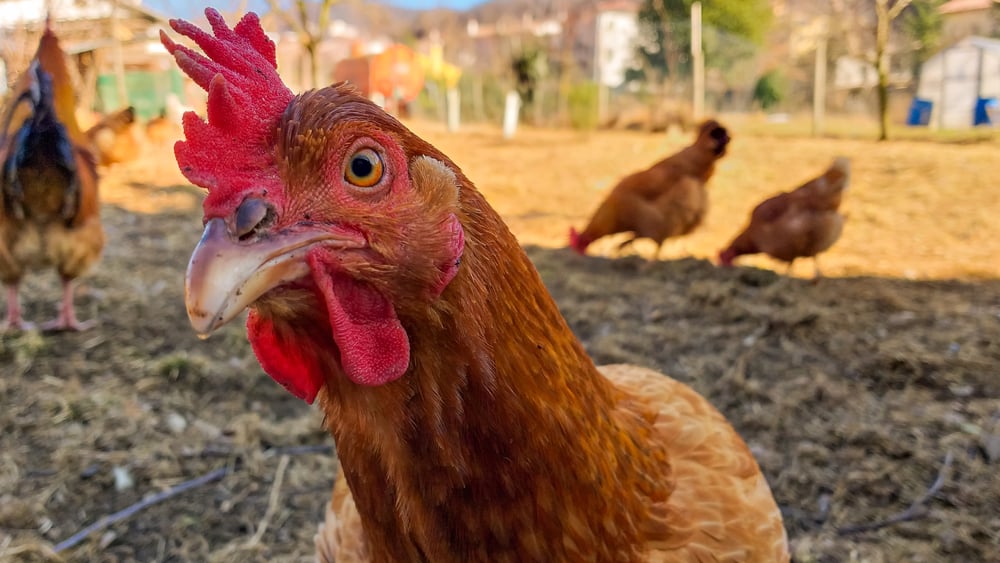
Why Raise New Hampshire Chickens on a Farm
Docile:
- New Hampshire chickens are a close relative of the Rhode Island Red Chicken, but more docile. This makes it one of the easiest chickens for someone nervous to raise them and one of the best chickens for a farm.
Low- Maintenance Free-Ranger:
- If you want a chicken that will be free-range and require no maintenance then look no further than the New Hampshire breed. This makes it perfect for anyone with a lot of space in their yard.
Why You Shouldn’t Raise New Hampshire Chickens
Lack of Space:
- If you have very little space you should think about raising a different type of chicken. New Hampshire Chickens do best when they can free-range.
Other Hostile Chickens:
- If you have other types of territorial chickens then it is best not to raise a new hampshire chicken. This breed can get hostile around other chickens and their food.
Common Factors of the BEST Farm Chicken Breeds
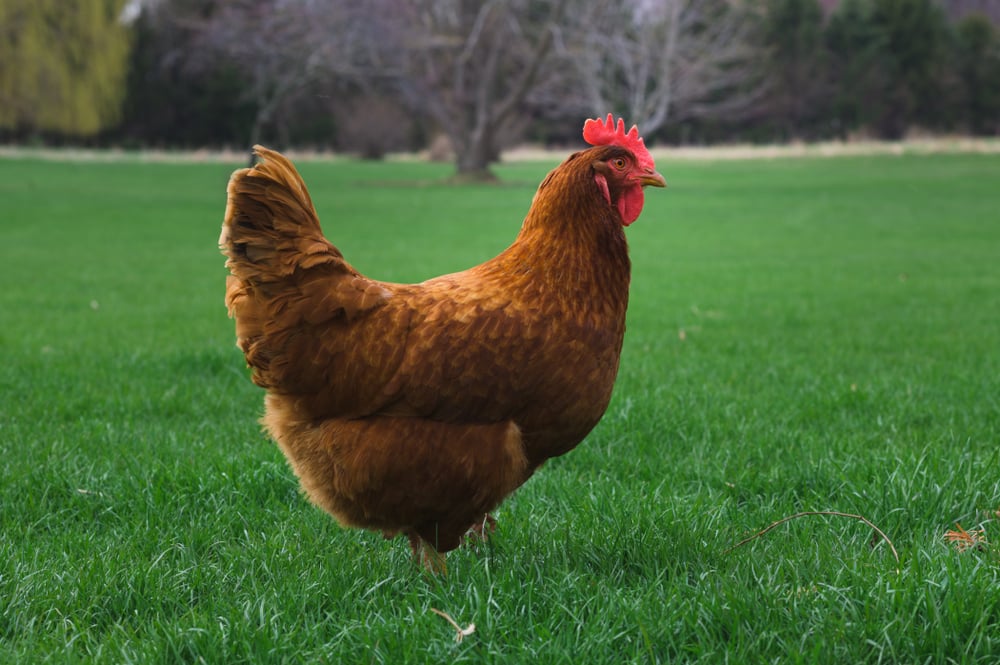
As a reminder, the below factors are common for the BEST Farm Chicken Breeds
- Family Friendly
- Hardy (Cold & Heat)
- Egg-Layers & Dual-Purpose (For Meat)
- Foragers
- Docile
- Low-Maintenance

